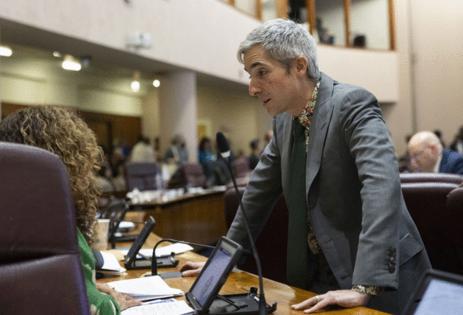Chicago 'granny flats,' coach houses one step closer to citywide legalization with vote
Published in Business News
CHICAGO — Aldermen advanced a measure that could legalize “granny flats” citywide with limited restrictions, a move advocates say will create more affordable housing.
The City Council’s Zoning Committee voted 13-7 to advance the additional dwelling unit ordinance. The result tees up a Wednesday vote by the full City Council, when aldermen could give a green light clearing the way for new garden apartments, attic-to-housing conversions and coach housing.
“Housing supply isn’t everything when it comes to affordability, but it is still essential,” Ald. Daniel La Spata, 1st, said. “I think citywide we are going to see a great benefit born from this ordinance.”
But opponents of the measure, many of whom represent neighborhoods filled with single-family homes, fear the measure will quickly and dramatically reshape their neighborhoods.
They say the change will add density and tax neighborhood resources — and could use a maneuver Wednesday to delay the full council vote for months.
In a bid to win them over, Mayor Brandon Johnson’s administration backed a new version of the ordinance Tuesday that expanded where in the city limits on the new units apply. Homeowners can only build one, two or three additional dwelling units per block, per year in areas zoned for single-family homes, though aldermen can opt out of the limits.
The compromise attempt also requires homeowners adding a unit in detached single-family homes to live in the building, a tweak aimed at alleviating concerns out-of-town investors would buy up such homes and stack on apartments. The concessions did little to win over opponents, however.
Ald. Anthony Beale, 9th, estimated that even with the limits, around 1,600 additional dwelling units could be built in his ward
“I’m trying to protect my community. Doing this by right without aldermanic approval doesn’t help me control my community,” Beale said. “I don’t know what alderman in their right mind would give up that authority.”
Additional dwelling units should be allowed, but should be approved with aldermanic input and not by right, Ald. Brian Hopkins, 2nd, argued.
“We are elected to make controversial decisions. We are elected to use our own judgment and represent the often competing interests.,” he told his colleagues. “I don’t think we should be yielding our decision-making authority for any issue at all.”
The ordinance would “ruin the integrity” of Chicago’s so-called bungalow belt, Ald. Marty Quinn, 13th, said. Quinn, the measure’s most vocal opponent, said he should be able to exempt his neighborhood from the ordinance.
“If we were serious about compromise, we would actually offer a carve-out,” he said. “For someone that represents the bungalow belt, I feel like my residents are having this ordinance jammed down their throats.”
But proponents of the measure argued it is a tool critically needed to cut red tape around development and add housing stock.
“The reality is there’s a lot of red tape that small landlords in particular have to jump through just to be able to provide units for our communities,” Ald. Jessie Fuentes, 26th, said.
Outgoing Zoning Committee Chair Ald. Walter Burnett, 27th, said added units could help people facing higher property tax bills make money needed to stay in their homes.
“We have got to figure out another way to allow people to stay in their neighborhoods,” Burnett said.
Changes in zoning and parking requirements caused the construction of additional dwelling units to be banned in Chicago in 1957.
The ordinance does not limit the square footage of coach houses, allows property owners to apply for parking space requirement exemptions and requires every second unit meet the city definition of “affordable.” It also bans additional dwelling units from being used as Airbnbs or other short-term rentals.
“This is housing for Chicagoans, not visitors,” sponsor Ald. Bennett Lawson, 44th, said.
Lawson cited the pilot program launched in 2021 legalizing additional dwelling unit construction. In his ward, included in one of the five pilot zones, only one block has seen two such units built, he said.
©2025 Chicago Tribune. Visit at chicagotribune.com. Distributed by Tribune Content Agency, LLC.












Comments